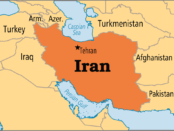Iran deal: Imperialists search for new strategy
What made crucial U.S. senators get behind the Iran nuclear deal?
The agreement was the product of negotiations between the Iranian government and what are called the P5+1 — the five permanent members of the United Nations Security Council plus Germany. Four of the six are imperialist countries that have fought major wars among themselves to recarve the world: the U.S., Britain, France and Germany.
 Just before the Obama administration announced that it had secured enough votes in Congress to keep its political opponents from shooting down the deal, we wrote in Workers World that the agreement was generally supported by the U.S. imperialist ruling class.
Just before the Obama administration announced that it had secured enough votes in Congress to keep its political opponents from shooting down the deal, we wrote in Workers World that the agreement was generally supported by the U.S. imperialist ruling class.
Two days after that, the newspaper that speaks most authoritatively for the billionaire corporations and banks on Wall Street and their policy makers revealed what had happened to tie down the votes in Congress that Obama needed.
In a front-page story in the Sept. 3 New York Times, Carl Hulse and David M. Herszenhorn wrote from Washington:
“Just before the Senate left town for its August break, a dozen or so undecided Democrats met in the Capitol with the senior diplomats from Britain, China, France, Germany and Russia who delivered a blunt joint message: Their nuclear agreement with Iran was the best they could expect. The five world powers had no intention of returning to the negotiating table.
“For many if not most Democrats, it was that message that ultimately solidified their decisions, leading to President Obama on Wednesday securing enough votes to put the agreement in place over fierce and united Republican opposition. One after another, lawmakers pointed to the warnings from foreign leaders that their own sanctions against Iran would be lifted regardless of what the United States did.”
Once Obama announced that Congress couldn’t nix the deal, Gen. Colin Powell, a Republican who had once been chair of the Joint Chiefs of Staff and then secretary of state under George Bush, also endorsed it.
This writer cannot recall any previous instance of Britain, France, Germany, Russia and China in a bloc telling U.S. politicians they would no longer go along with sanctions that had been imposed mainly through Washington’s pressure.
This certainly has never happened in the 55 years of sanctions on Cuba, despite yearly U.N. General Assembly resolutions to end the blockade, in which Washington usually could count on only one or two other votes against the rest of the world. Of course, China and the USSR, later Russia, never joined in the sanctions against Cuba.
The unprecedented intervention in favor of the Iran deal by the five countries was of course welcomed — and presumably engineered — by the Obama administration, which had faced stiff, although largely demagogic, Republican opposition.
Two parties, one ruling class
Most liberal media in this country portray the Democratic Party as the party of the “people” and the Republicans as the party of big business. The truth is quite different. Both are really parties of big business and have served the interests of the super-rich well. When it comes to foreign policy — and especially the launching of aggression to facilitate imperialist plunder — they have always joined together in waving the flag and voting funds for war.
Republican and Democratic administrations have alternated in launching these wars, with the enthusiastic support of the party out of office.
But right now, the imperialists are in a big mess in Southwest Asia and Northern Africa. Their costly wars against Afghanistan, Iraq, Syria and Libya may have pumped up the profits of the military industries, but they have yielded little else except immense suffering of the people, completely unstable puppet regimes and an unprecedented flood of desperate refugees into Europe.
Ever since the Iranian Revolution of 1979 overthrew the Shah, a puppet put on the throne by a CIA coup, both U.S. capitalist parties have stoked hatred against Iran. But Iran has survived, even under sanctions, and imperialist efforts at regime change have not succeeded.
Politics in the imperialist countries are so geared to pumping up big-power chauvinism that it seems easier for the capitalist parties to start a war than to back off from one, even when they know it will only blow back on them. In this case, however, that’s what their imperialist masters want the politicians to do, at least for now.
It is clear that the foreign policy establishment is trying to come up with a new strategy that will boost Wall Street’s fortunes in this strategic area. That’s not easy. While the U.S. and its European imperialist allies have often joined in bombing and/or invading countries in an attempt to set up neocolonial regimes, they are also in cutthroat competition with one another, made all the fiercer by worldwide capitalist economic stagnation.
Moreover, all the previous Pentagon interventions have only turned more and more of the targeted peoples against them.
The working class in the United States — the 99% — has the same enemy as do the peoples of Iran, Libya, Syria, Afghanistan and Iraq: the imperialist plutocrats. These robbers will do anything to boost their profits, from paying below-minimum wages at home to laying waste to whole countries. A setback to their plans would be a welcome development for all workers and oppressed peoples.

